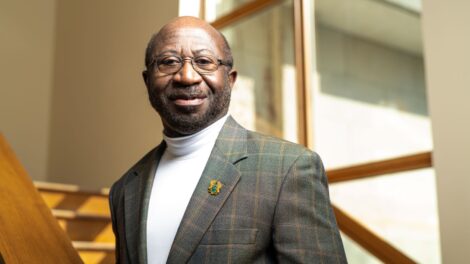Associate professor of international affairs will offer a new perspective on the battle against deforestation

Caleb Gallemore, associate professor of international affairs (Photo by Adam Atkinson)
By Stella Katsipoutis-Varkanis
For more than 10 years, Caleb Gallemore, associate professor of international affairs, has been studying various environmental policy approaches that utilize market signals to discourage deforestation. These approaches include forest carbon offsetting (i.e., when the conservation or planting of a forest is funded by the selling of carbon offsets for the avoided emissions), direct payments for environmental conservation activities, and ecolabels that indicate goods have been produced according to environmental standards.
As the keynote speaker delivering the 2023 Thomas Roy and Lura Forrest Jones Faculty Lecture on Tuesday, April 18, Gallemore will argue that as popular as market-based environmental approaches might be, their non-market features might in fact be the most important factors in their success or failure.
In his talk—which is titled “This is not (just) a market: Non-market aspects of international market-based environmental policies”—Gallemore will The talk will focus on evidence from peer-reviewed literature and research he conducted with numerous colleagues and students that suggests market-based approaches might be successful less so because they create monetary incentives, but more so because they sometimes foster strong collaborative social networks or nudge people’s already existing environmental values.
“Deforestation is a major factor in biodiversity and habitat loss,” Gallemore says. “Being that April is Earth Month, it’s the perfect time to reflect on what can be done on this pressing issue. It is a great honor to be asked to share my work, and it has given me strong motivation to reflect carefully on what my research is actually telling me, which has helped me see a message in all of it that I hadn’t previously.
“If we want to slow down the rate of species loss on the planet, we have to figure out a way to protect forests more effectively,” Gallemore continues. “The problem is that our most common approach—slapping down a protected area—often harms the livelihoods of local people, who are often poorer and less politically powerful. In the extreme, it is also associated with evictions and violence. If we can reform some of the approaches that we currently call ‘market-based,’ maybe we could manage these issues more effectively. To my knowledge, nothing in the literature has approached market-based environmental policy from quite this angle before.”
Gallemore says anyone who is interested in rethinking policies to push back against the biodiversity crisis, and is curious how current policies are playing out in different parts of the world, should attend the lecture. The event is free and open to the public.
“It is a great honor for Prof. Gallemore to be nominated by his peers to give the Jones Faculty Lecture, which is customarily given by newly tenured faculty,” says Lafayette Provost John Meier. “Prof. Gallemore’s students absolutely love him. His research is engaging, and everyone is highly encouraged to attend and celebrate this outstanding example of a teacher-scholar at Lafayette.”


